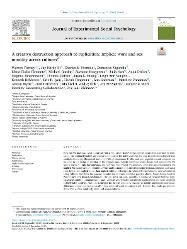| dc.contributor.author | Tierney, W. | |
| dc.contributor.author | Hardy, J. | |
| dc.contributor.author | III | |
| dc.contributor.author | Ebersole, C.R. | |
| dc.contributor.author | Viganola, D. | |
| dc.contributor.author | Clemente, E.G. | |
| dc.contributor.author | Gordon, M. | |
| dc.date.accessioned | 2023-10-19T15:05:13Z | |
| dc.date.available | 2023-10-19T15:05:13Z | |
| dc.date.issued | 2021 | |
| dc.identifier.issn | 0022-1031 | |
| dc.identifier.uri | https://doi.org/10.1016/j.jesp.2020.104060 | |
| dc.identifier.uri | https://hdl.handle.net/20.500.12469/4744 | |
| dc.description.abstract | How can we maximize what is learned from a replication study? In the creative destruction approach to replication, the original hypothesis is compared not only to the null hypothesis, but also to predictions derived from multiple alternative theoretical accounts of the phenomenon. To this end, new populations and measures are included in the design in addition to the original ones, to help determine which theory best accounts for the results across multiple key outcomes and contexts. The present pre-registered empirical project compared the Implicit Puritanism account of intuitive work and sex morality to theories positing regional, religious, and social class differences; explicit rather than implicit cultural differences in values; self-expression vs. survival values as a key cultural fault line; the general moralization of work; and false positive effects. Contradicting Implicit Puritanism's core theoretical claim of a distinct American work morality, a number of targeted findings replicated across multiple comparison cultures, whereas several failed to replicate in all samples and were identified as likely false positives. No support emerged for theories predicting regional variability and specific individual-differences moderators (religious affiliation, religiosity, and education level). Overall, the results provide evidence that work is intuitively moralized across cultures. © 2020 The Author(s) | en_US |
| dc.description.sponsorship | Jan Wallanders och Tom Hedelius Stiftelse samt Tore Browaldhs Stiftelse; Institut Européen d'Administration des Affaires, INSEAD; Knut och Alice Wallenbergs Stiftelse; Marianne and Marcus Wallenberg Foundation, MMW | en_US |
| dc.description.sponsorship | Eric Luis Uhlmann is grateful for an R&D grant from INSEAD in support of this research. Anna Dreber is grateful for generous financial support from the Jan Wallander and Tom Hedelius Foundation (Svenska Handelsbankens Forskningsstiftelser), the Knut and Alice Wallenberg Foundation and the Marianne and Marcus Wallenberg Foundation (Anna Dreber is a Wallenberg Scholar), and Anna Dreber and Magnus Johannesson are grateful for a grant from the Swedish Foundation for Humanities and Social Sciences. | en_US |
| dc.language.iso | eng | en_US |
| dc.publisher | Academic Press Inc. | en_US |
| dc.relation.ispartof | Journal of Experimental Social Psychology | en_US |
| dc.rights | info:eu-repo/semantics/openAccess | en_US |
| dc.subject | Culture | en_US |
| dc.subject | Falsification | en_US |
| dc.subject | Implicit social cognition | en_US |
| dc.subject | Priming | en_US |
| dc.subject | Replication | en_US |
| dc.subject | Theory testing | en_US |
| dc.subject | Work values | en_US |
| dc.subject | article | en_US |
| dc.subject | controlled study | en_US |
| dc.subject | destruction | en_US |
| dc.subject | education | en_US |
| dc.subject | false positive result | en_US |
| dc.subject | human | en_US |
| dc.subject | human experiment | en_US |
| dc.subject | morality | en_US |
| dc.subject | null hypothesis | en_US |
| dc.subject | prediction | en_US |
| dc.subject | replication study | en_US |
| dc.subject | social class | en_US |
| dc.subject | social cognition | en_US |
| dc.subject | theoretical study | en_US |
| dc.title | A creative destruction approach to replication: Implicit work and sex morality across cultures | en_US |
| dc.type | article | en_US |
| dc.identifier.volume | 93 | en_US |
| dc.department | N/A | en_US |
| dc.identifier.doi | 10.1016/j.jesp.2020.104060 | en_US |
| dc.identifier.scopus | 2-s2.0-85097902093 | en_US |
| dc.institutionauthor | N/A | |
| dc.relation.publicationcategory | Makale - Uluslararası Hakemli Dergi - Kurum Öğretim Elemanı | en_US |
| dc.authorscopusid | 57190064552 | |
| dc.authorscopusid | 57210505547 | |
| dc.authorscopusid | 56389603700 | |
| dc.authorscopusid | 57203360628 | |
| dc.authorscopusid | 57219229295 | |
| dc.authorscopusid | 57218707519 | |
| dc.authorscopusid | 57204028340 | |
| dc.khas | 20231019-Scopus | en_US |
















